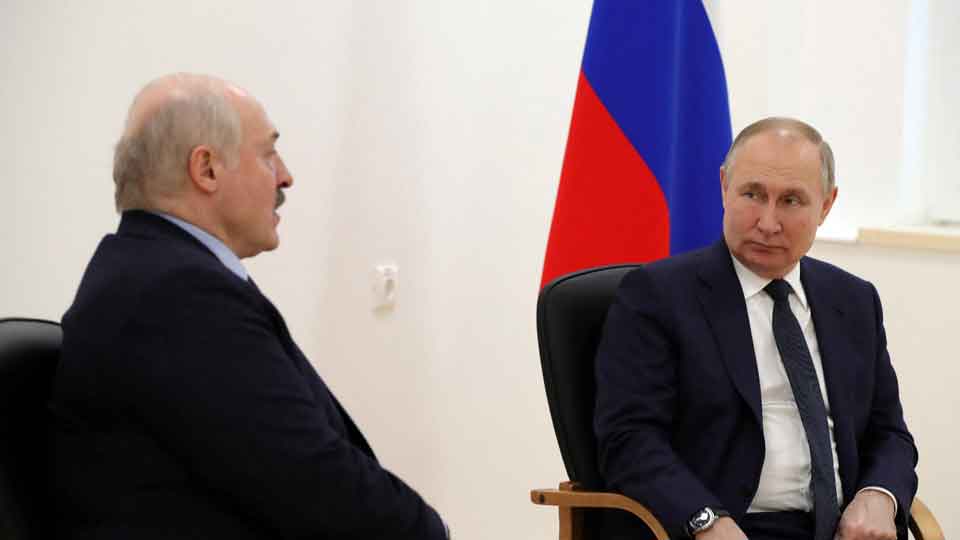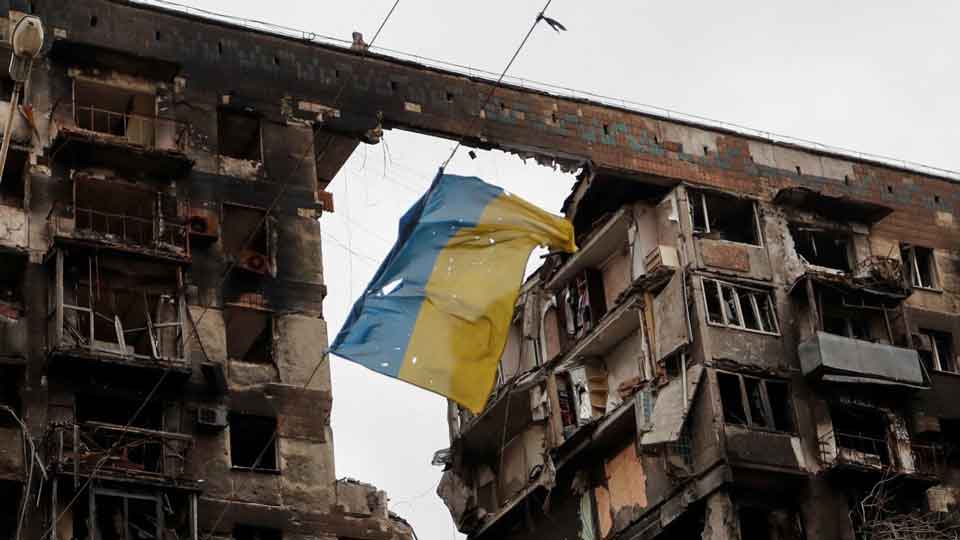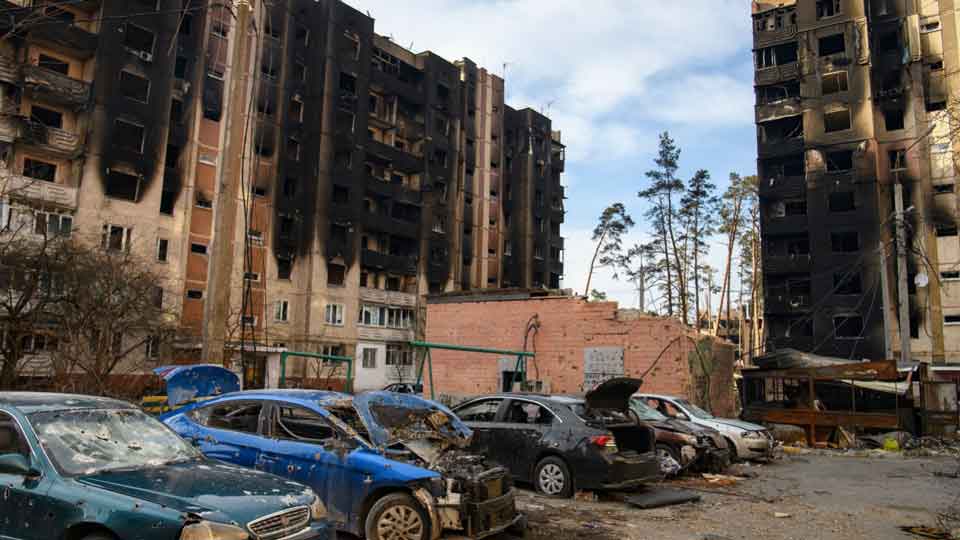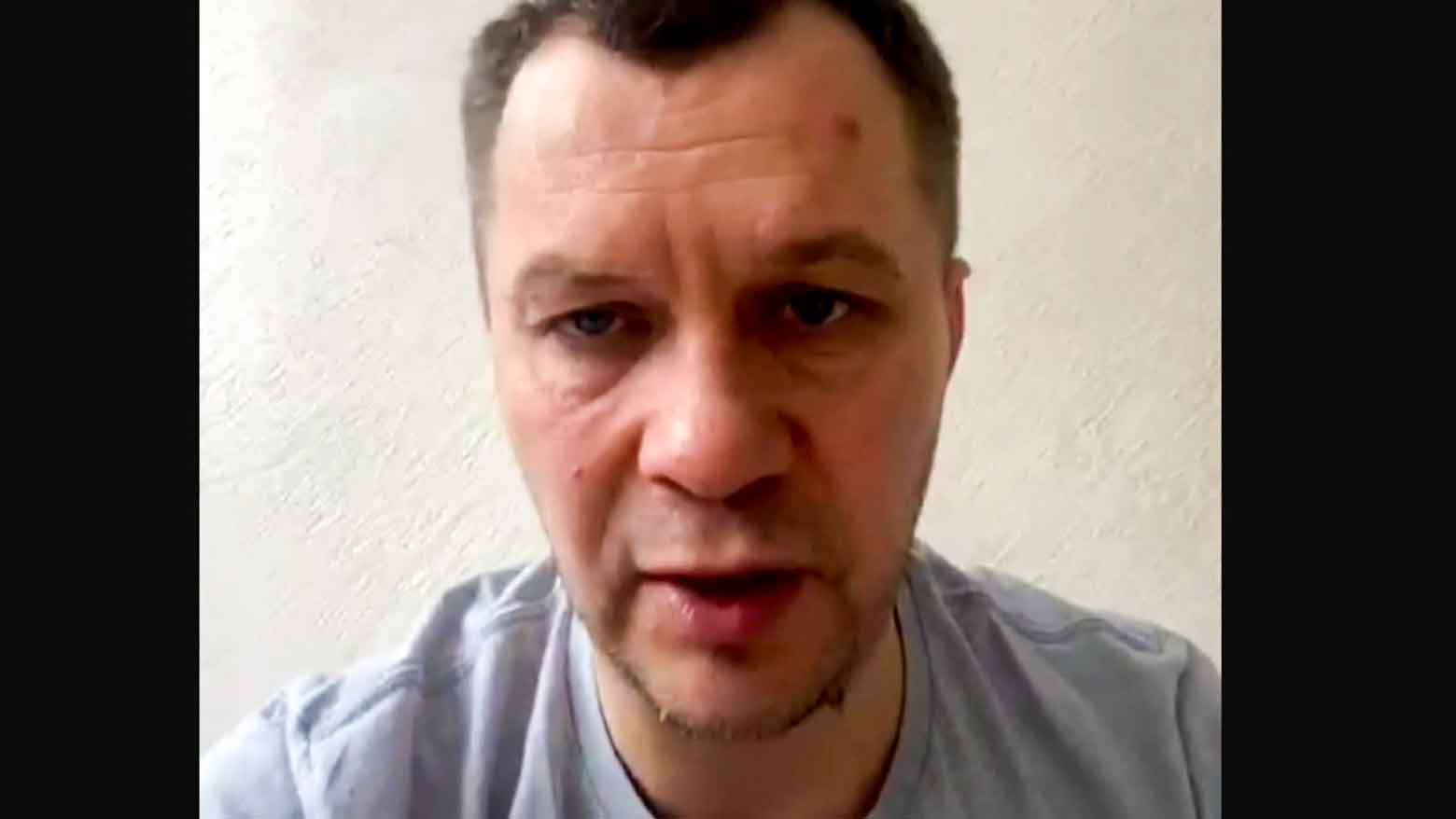February 28, 2022 — 4 days after start of the Russian invasion.
Ebara: Is Russia trying to take the capital Kyiv, where you are?
Mylovanov: Russia's doing a full-scale operation against Kyiv. But it's going to be protracted. Russian forces have started digging in. That means they're preparing for a much longer conflict. Their hope was they would take Kyiv in a day or two but that failed. It is a total humiliation for President Putin, because Russia is presumably a superpower, which the entire world is supposed to be afraid of. Putin has claimed for years that Ukraine is not even a country. But he couldn't do [what he wanted]. This means Putin's collapse, even if it's only internally, among his elites. [The Russian armed forces] will try until they run out of energy, supply lines, political support, and popular support domestically. But the sanctions all countries are imposing are going to squeeze Russia into an economic crisis. This is actually warfare in a sense, to put economic sanctions on their ability to logistically supply their military operations in Ukraine.
Ebara: So you would say the sanctions on Russia are working?
Mylovanov: Yes, they're helping right now. The fact that the Russian exchanges and interbank exchanges delayed opening actually means that they're being really stressed. I'm focusing on immediate effects on the military in the field. That means their supply lines will also suffer. That is also helping the Ukrainian side to buy time.
Pattern of Putin's wars
Ebara: What do you think Putin wants to achieve in Ukraine?
Mylovanov: At this point, I've stopped thinking about what he wants to achieve, because everything I had hoped he wouldn't do, he has done. So now if someone said surely he wouldn't do that, I would say, really? What have the past several months or years taught us? It's more useful to look at the pattern, rather than trying to logically strategize about what his objective is or what his next move is. It is also clear that Putin is not a strategic or tactical genius. A lot of people have portrayed him as such but his campaign has failed. His military is stuck, his economy is under pressure. And Putin has made many statements and demands of Ukraine. But they're totally unconnected to reality. In fact, the rest of the world also had thought that Ukraine might collapse. There is a big problem in the international community that everyone has been studying Putin and Russia. But people should have studied Ukraine and interactions between Ukraine and Russia. Whatever is in the head of Putin is not the only thing that will determine the outcome. Look at how the Ukrainian president rose to the challenge. No one had studied him as recently as a week ago. There were such dismissive articles in the Western press about a comedian who doesn't know what he's doing. And people really got it wrong.
So the correct way to think about this is to look at the pattern of the events that have developed in the region since the collapse of the Soviet Union, even under Boris Yeltsin — not only under Putin. First there was Moldova, then Chechnya. Putin brought the Chechen war to an end in such a brutal way. Remember Grozny and the war crimes — people are still suffering there.
Could Putin commit war crimes? We already know that he could, he has no empathy toward humans. He has zero empathy toward his own military and soldiers. They just drop them and send them to die. Maybe I shouldn't be saying this, but I feel bad for some of them, they are just kids. They get lost and walk around and they get shot at by the Ukrainian military.

Back to the pattern, there was Georgia in 2008, then Belarus. And now, Belarus is involved in this war and sending ships or troops. It is fully controlled by Putin. The political elite in Russia has been undermining democracy and harassing using the military, but also diplomatic and economic mechanisms to weaken the European Union and its role in the region. And now, they're going all in, as if this were a final stand. Now, if Ukraine falls, which I think it will not, but if it does, the Baltic countries are next, Poland is next, what's going to stop them? If Ukraine resists, I think that's the end of Putin's regime.
No more "Bloodlands" in Ukraine
Ebara: Tell us what the Ukrainian people want for their country?
Mylovanov: We just wanted to be left alone so that we can figure out our fate for ourselves, but Russia wouldn't let us do it. We also wanted to join Europe, but after time we got frustrated, since there was no serious effort to take us, we were treated as some kind of second rate [state]. So we want to have sovereignty. We want to be independent. We want to be a democracy. And we have demonstrated time and again — in 1991 after the Soviet Union collapsed, in 2004 during the first revolution, and 2014 during the second revolution. That time, the secret police were kidnapping and shooting at our protesters but we did it anyway. We're also demonstrating it now.

But the history goes much deeper. Ukraine tried to be independent in 1917 when Russia collapsed and the Bolsheviks came and shot everyone who tried to resist. Then there was Holodomor [in 1933], where they executed people and parents had to decide which child to kill so as to feed the other one. It was awful. In World War Two, Ukraine lost between 8 and 12 million people. During the Soviet time, the KGB was always harassing and terrorizing us. I was born under the Soviet Union. It said I was Russian, my language was Russian. They would call me an ethnic Russian, but I'm different from them. I'm a Ukrainian. Timothy Schneider called this part of the world "Bloodlands." It's time for this to stop. I think it's time for Ukraine to win and to secure itself, to become a fortress and for Russia to collapse and hopefully to move to democracy.
March 8, 2022 — 3 weeks in.
Ebara: What's the latest situation where you are right now?
Mylovanov: We had moved to a suburb of the capital but that turned out to be where the Russians were advancing through. So, where we were staying wasn't destroyed totally but we were repeatedly bombed, so had to keep moving. This is a new normal for us.
Ebara: What's the situation for people in other areas?
Mylovanov: It depends where you are, essentially. So there is the military on the front line. Then there are people who are not fighting but trying to help the civilian population in towns that are either surrounded or occupied by Russians. And then there is everyone else outside of those territories. Areas under the Russian forces are nasty. What we're hearing from Irpin and other similar warzones [is that] they're completely destroyed — erased to the ground, essentially. We hear that a column of Russian tanks would pass and the last ones would shoot at the buildings and destroy everything. The logic is either terror or to ensure that there's no resistance behind their lines. Once they pass, they destroy everything. They kill everyone behind you to make sure that no one is there. I think it's going to be really bad. In Bucha, Sumy and other towns, the Russians have bombed critical infrastructure, so people don't have water or electricity.

Ebara: Last time I spoke to you, you said the sanctions on Russia would be effective. What are you seeing on the ground at the moment?
Mylovanov: There are two things. One is the direct feel on the kinetic military action. First of course, through panic, it sends a message to troops that things might not be as smooth as in previous wars. Putin waged wars in Chechnya, Georgia, Syria and Crimea. I think if they were extrapolating from these wars, everything they got this time is very different. And if they see sanctions and economic crises, they see that Russia is going to be isolated. That has not happened before — never. The second thing is that an economic crisis feeds immediately into difficulties supplying the military, which of course has an immediate effect on the battlefield. So that's the short-term effect.
"The moment we are afraid of Putin, he will dictate to us."
Ebara: What do you make of Putin's threat to use nuclear weapons against Ukraine — do you think that's possible?
Mylovanov: Some people are debating whether it's a bluff or not. I don't think rational thinking can be applied here. It's no longer a strategic kind of military operation. It's toxic behavior. Putin is not going to gain anything. It's definitely not going to make Russia great. It's a bargaining chip, but no one wants to see him at the table. He's totally capable of this, in my view. One time in the US there was a guy who kidnapped teachers and some kids in a kindergarten. Police were trying to negotiate with him, but the moment he took a knife and pointed it at the neck of a child, a sniper shot him. That's what Putin is doing. We don't know if he's going to kill the child. But he has definitely threatened to pull out a knife and cut the child. The world has to act — if not for Ukraine, then for its own security. The moment he moved into the rhetoric about nuclear threats, we understood that Russia has to be neutralized. Because the nuclear doctrine of today is not an offensive capability or capacity. It's a deterrence. It's a defensive weapon. He's using it as rhetoric; as an offensive weapon. Whether Putin is bluffing or not, the moment we become afraid of him, he is going to dictate to us. You have a bully on a block and the bully says, I'm going to shoot you. And everyone says don't confront him because he might really shoot you. But you have to confront him because otherwise he will tell you what to do for the rest of your life. So here the world has to start thinking about what to do so Russia cannot even think about using nuclear weapons. Our conversation should be about what we must do to make sure that Russia doesn't have the capacity to launch nukes in the future.
Ebara: What are your messages to Russia and to the world?
Mylovanov: I have a message to people in Russia. My native language is Russian and half of my family is from Russia. I only started speaking Ukrainian after 2014. I have a lot of friends who are Russian. Simply, the Russian government is lying. Just find out for yourself what the truth is. Don't be afraid and don't be intellectually lazy. It's not politics anymore. It's about humanity. So it's your responsibility to find out what really is happening and form your own independent opinion. And if this is wrong, then you have to resist. It's your obligation as a human on this planet to resist evil.
My message to the world is, when there is evil and evil is talking about nukes, no one can stand aside. It's dangerous beyond any normal proportions. So don't be in denial. And think a little bit about what it means for the world. And this is not a joke — I will give you a little piece of information: Ukraine and Russia together supply 30 percent of the world's wheat. That means we're looking at a possible major food-security crisis as well. This is a big issue and it will be a defining moment for at least half of this century, unfortunately.
TO BE CONTINUED.

